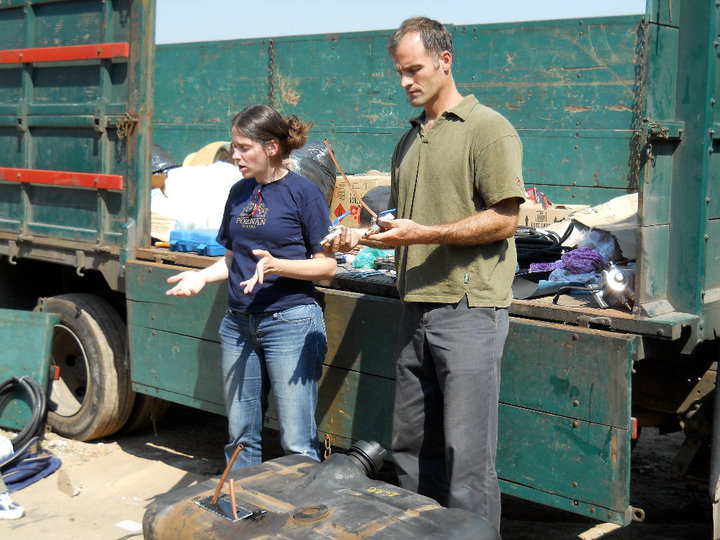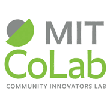CoLab Radio
You can leave a comment.
August 4, 2010 By Dayna Cunningham
August 24, 2010 By Sara Barnowski
Although three members of the Green Grease team have already been in Brazil for a week, networking and preparing for the grease conversion workshop in Cruma, a Sao Paulo waste picker cooperative, the bulk of the team arrived in Brazil yesterday very early in the morning. After being apart for a few months, it was exciting to be reunited in the beautiful courtyard of team member Ana Bonomi’s home. We quickly got caught up on each other’s lives and the project’s progress and were then greeted with a delicious buffet lunch. Ana’s family has been absolutely wonderful to us, feeding us nearly constantly since we arrived.
After the warm welcome that we received, we plunged headfirst into Brazilian culture: first with a fantastic dinner of assorted regional foods and then with caiperinhas (a Brazilian drink made with cachassa, sugar cane alcohol) and samba music at a tiny club in Vila Madelena. Even though we were exhausted from traveling all night, it was a great way to start the week.
Some concerns we had coming into the project were the local supply of parts we needed for the conversion and the quality of waste vegetable oil collected by the catadores (waste pickers). We were initially relieved to learn that a local mechanic had all the necessary parts and that Patrick Keaney who runs a Boston-based conversion business had deemed the oil quality good enough to filter and put into a diesel engine.
Over the last two days however as we prepared for the conversion workshop and completed the video script and instructional manual, we ran into some bumps: evidently three-way valves, as well as some of the other necessary parts, are very expensive in Brazil. To keep within our budget we were forced to do a last-minute redesign of our system. However, not only are we confident that everything will work out but the new design is actually quite a bit simpler and easier to explain.
Tomorrow we will hold the first of three day-long workshops with the catadores. We are expecting 20 people to attend, but because we are not entirely certain what to expect in the coop we are truly flying by the seat of our pants. Limitations include the fact that only three group members have ever been to a waste picker cooperative, we have never seen the vehicle that we are converting, and in the end we are not entirely certain if we have all of the correct and necessary parts. Despite all of this, I am very excited and I am sure that tomorrow will provide a much clearer picture of what we will need to do in order to be successful during the rest of the week.
Sara Branowski completed a Bachelor’s Degree in Environmental Engineering in 2010. She is now at Stanford, working on her Master’s Degree.
August 26/10 By Samantha Fox
We just finished day two of our workshop! It’s been going pretty well so far. Some hiccups, but nothing impossible to overcome.
Day1:
We got a little lost on the way to Cruma, but with Ana S.’s awesome direction-asking skills, we were able to get there only 5 minutes late (and still earlier than most of the catadores we were working with). By the time people had arrived and we were set-up, it was after 10. We spent the first half of the day going over the system and discussing any concerns people might have (such as: will it damage my engine?). They asked a lot of great questions, and I was impressed with some other their prior knowledge of how diesel engines work and what could potentially go wrong. After lunch, we started to work on the tank. Unfortunately, there was a delay in most of the parts we ordered, and parts that should have been there were not. We sent a couple of our teammates to go pick-up the parts, and realized that there had been some miscommunication, and several of our parts were not usable, including some important fasteners.
Day 2:
I missed the morning session because I was working on the manual with Libby, but when I got there, the team was working on the truck. Apparently, when they got to Cruma in the morning, the catadores were filtering more WVO, with one teaching them how it is done (there were a few new people who had missed the previous day). It was a hotter day than before so people really seemed to be dragging, so when lunch came around, I think most people were ready for a break from the outdoors. After lunch we started working on the coolant and fuel systems, running the hoses and connecting where things needed to be connected. People really seemed to be interested in this part. Unfortunately again, we were left with incorrect parts, and didn’t have the correct valves for the last part of the fuel system conversion (making the return line split into WVO or diesel). We had some issues with the tank, it had some junk in it and got clogged, but that should be easy to fix tomorrow.
It was really encouraging to see more people (and a lot of repeats) at the second day. It means people are still interested, and actually care about what is happening. One man in particular, Edson, is mechanically-minded and already filters WVO. He has really shown a lot of interest and has been an amazing help in explaining the system in Portuguese. There was some downtime today, and some of the other people asked him a few questions about the hoses that we had just put in the vehicle. While I’m not fluent in Portguese (at all), he seemed to understand and explain correctly. Another thing that has been awesome to see is the ingenuity of the people we are working with. They willing give opinions about the system and have some great comments. There have been a few times when we didn’t have all the parts necessary for the conversion, and needed to ask them to help us find something. Every time this happened, several people would come back within 5 minutes with the perfect thing.
I’m really excited to see how tomorrow goes! The goal is to have the catadores do a lot more of the actual conversion. It will show who the leaders are, and just how much they actually retained from the past two days!
Samantha Fox completed a Bachelor’s Degree in Environmental Engineering in 2010. She is now at Stanford, working on her Master’s Degree.
August 27/10 By Ana Luisa Santos

As the only team members from Brazil, Ana Bonomi and I supported the team by driving and translating. Even though it was very demanding, it was also a great opportunity to bond with both our team members and local partners.
Driving was fun! After 3 years of bike rides in Cambridge, it was awesome to try again the fight-for-your-space-on-the-road traffic in Brazil. I missed this driving style. But as I am not familiar with São Paulo, I got lost many times. On our way back from Cruma on workshop day #1, I lost sight of Ana Bonomi’s car in great style, as I forgot our cell phone and had no idea where we wwew. Sara, Sam, Hossam and I went for an involuntary 1.5 hour tour throughout São Paulo untill we finally found Ana Bonomi’s house. I am glad the team was very patient, kind, and we made fun of the situation. Thankfully, Hossam got us a map on the second day, which prevented us from getting lost again on this gigantic city. According to IBGE, Brazil’s census institute, 22MM is the total population of the official metropolitan area of Sao Paulo, spread throughout 3,067.2 sq. Miles.

The team made a great effort to communicate with our partner catadores. We also split tasks well to optimize the communication and all kept a great attitude when translators were busy. Sara and Sam had a good advantage of speaking Spanish. Libby’s portuguese was getting better and better. Ângela and Hossam seemed to understand more and more each day. Our mechanic-fix-it-all partner Patrick Keaney impressed all of us by introducing snippets of Portuguese to his English sentences during the workshop. He kept reading his portuguese book and asking for vocabulary on our way to the Coop. At times it was quite funny. While building an improvised mechanical part, he repeated a popular saying in portuguese: “Quem nao tem cao, caca com gato”, meaning “if you don’t have a dog, you can hunt with a cat”. Soon catadores started calling him “McGyver”, the 90’s TV show fix-it-all icon. After Day #2, some catadores could communicate with Patrick with gestures or intuition of what needed to get done. It was amazing to witness catadores’ commitment and interest despite the language barrier. My voice was gone after 5 days, but it was very rewarding to help the team communicate with our local partners.
Ana Luisa Santos completed a Masters Degree at the MIT Media Laboratory in 2009. She is now back to her beloved Brazil to start her first company.
September 22/10 by Laura Fostinone
To begin with, here in Brazil we have an impression that Americans are super sophisticated, That they are the type of people who only work with computers. Not directly in the field, not even to work with poor people in hard conditions. I know that this impression is wrong, but the waste pickers don't. The thing that I realized that surprised them (and me also, I must confess) the most was the effort that the girls were putting on the project, the 3 days workshop of the Green Grease. The girls didn't seem preocupied about the smell of the waste, about the heat of Brazil, about the challenges they were facing to make the oil engine work.
When I was at Cruma, the coop that host the workshop, one of the catadores (wastepickers) looked at me and said: "These girls are very hard working! I thought americans were not envolved in this type of work at all! " and they also said "Raça!", a brazilian expression commonly used for football players, when they are trying to reach the goal, sweting so on and so fourth.
After the Green Grease project goals, I had already gone to one of my coops, Cooperglicério, and they have learned somethings with the team and the other catadores they can use right away at the oil management for increasing the incomes, for example:
making the oil clearer can raise the price from R$ 0,50 a litre to R$ 0,75. That is very representative for the catadores.
I was very gald to participate and I'm anxious to see the knowhow learned at workshop multiplied to other coops.




